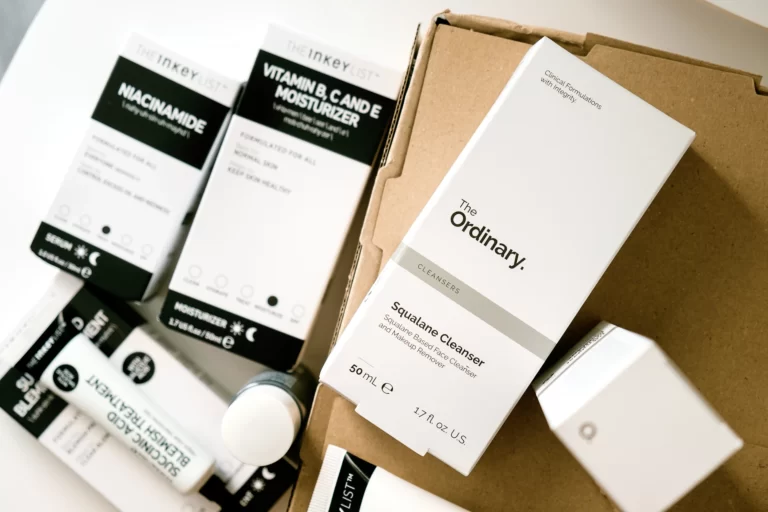Greetings, skincare aficionados! Do you share my unwavering quest for glowing, flawless skin? If so, get ready to be astonished as we embark on a journey of exploration together.
Lately, the buzz around niacinamide and peptides has been impossible to ignore, and it’s time we unravel the truth behind these skin-transforming wonders.
Imagine a world where your skin’s potential knows no bounds – where blemishes, dullness, and imperfections become mere memories of the past. Picture yourself with a luminous and youthful glow that turns heads and makes others wonder about your secret. Well, wonder no more, for we are about to unearth the hidden gems that can truly revolutionize your skincare routine.
Table of Contents
Niacinamide And Peptides
Niacinamide, also known as vitamin B3, is a water-soluble vitamin that plays a crucial role in maintaining healthy skin. It has been shown to improve the skin’s barrier function, reduce inflammation, and even out skin tone.
Peptides, on the other hand, are short chains of amino acids that can help boost collagen production, improve skin elasticity, and reduce the appearance of fine lines and wrinkles.
But what happens when you combine niacinamide and peptides in your skincare routine? Can they work together to give you even better results? The answer is yes!
When niacinamide and peptides are combined in your skincare routine, they can work synergistically to deliver even better results for your skin. Niacinamide helps improve skin texture, reduce inflammation, and address hyperpigmentation, while peptides contribute to enhancing the overall firmness and elasticity of the skin, creating a powerful duo for a radiant and youthful complexion.
Understanding Niacinamide
If you’re looking for a powerful ingredient to include in your skincare routine, you might want to consider niacinamide. Niacinamide is a form of vitamin B3 that has been shown to have a range of benefits for the skin. In this section, I’ll explain what niacinamide is, its benefits, and potential side effects.
Benefits of Niacinamide
Niacinamide has been shown to have a range of benefits for the skin. For example, it can help to:
- Boost hydration: Niacinamide can enhance the function of your skin’s lipid barrier, which helps to lock in moisture and keep pollutants out.
- Reduce inflammation: Niacinamide has anti-inflammatory properties, which can help to calm redness and irritation in the skin.
- Improve skin texture: Niacinamide can help to reduce the appearance of fine lines and wrinkles, as well as improve the overall texture of the skin.
- Minimize the appearance of pores: Niacinamide can help to reduce the size of pores, making them less visible.
Niacinamide can be a great ingredient in your morning skincare routine due to its ability to strengthen the skin barrier and protect the skin from UV damage.
— Simone Sydel | TheSkinCareCulture.com (@skincareculture) July 28, 2023
That said, niacinamide isn’t a replacement for sunscreen, so you should always finish your morning routine with high SPF.
Potential Side Effects of Niacinamide
While niacinamide is generally considered safe for most people, it’s still important to be aware of potential side effects. Some people may experience:
- Mild irritation: Niacinamide can cause mild irritation in some people, especially if they have sensitive skin.
- Allergic reactions: In rare cases, niacinamide can cause an allergic reaction, which may include symptoms such as itching, redness, and swelling.
Pro Tip: To maximize the benefits of niacinamide, look for products that contain at least 5% niacinamide. You can also combine niacinamide with other ingredients, such as peptides, to enhance its effects
In my personal experience, using niacinamide has helped to improve the overall texture and appearance of my skin. I’ve noticed that my skin looks smoother and more hydrated, and I’ve also experienced a reduction in redness and irritation.
Understanding Peptides
As someone who has been interested in skincare for years, I was excited to learn about the benefits of peptides. Peptides are short chains of amino acids that are naturally found in our bodies. They can be found in many skincare products and have been shown to provide numerous benefits for the skin.
Benefits of Peptides
Peptides can help to stimulate collagen production, which is essential for maintaining youthful and healthy-looking skin. Collagen is a protein that gives our skin its structure and elasticity, and as we age, our bodies produce less of it. By adding peptides to our skincare routine, we can help to boost collagen production and reduce the appearance of fine lines and wrinkles.
Peptides can also help to improve skin texture and tone. They can help to reduce inflammation and redness, and can even help to fade dark spots and hyperpigmentation. Additionally, some peptides have been shown to have antioxidant properties, which can help to protect the skin from damage caused by free radicals.
3- It’s time to use anti-aging ingredients!
— Sang Bulu HQ (@SangBuluHQ) July 25, 2023
Look for skincare products containing proven anti-aging ingredients like retinol, hyaluronic acid, vitamin C, peptides, and antioxidants.
These ingredients can help reduce the appearance of fine lines, wrinkles, and age spots.
Potential Side Effects of Peptides
While peptides are generally considered safe for most people, there are some potential side effects to be aware of. Some people may experience:
- Mild irritation
- Redness
Additionally, some peptides may be more effective than others, so it’s important to do your research and choose products that contain high-quality peptides.
Overall, I have found that incorporating peptides into my skincare routine has been extremely beneficial. I have noticed a significant improvement in the texture and tone of my skin, and my fine lines and wrinkles have become less noticeable.
If you’re interested in trying peptides for yourself, be sure to talk to your dermatologist and choose products that are appropriate for your skin type and concerns.
Are Ceramides or Peptides Better?

When it comes to skincare ingredients, there’s always a debate about which one is better. Ceramides and peptides are two popular ingredients that are often compared to each other. While both have their benefits, I personally think that peptides are better for my skin.
Peptides are short chains of amino acids that are the building blocks of proteins. They help to stimulate collagen production, which is essential for maintaining skin elasticity and firmness. Peptides can also help to reduce the appearance of fine lines and wrinkles, making them a great anti-aging ingredient.
On the other hand, ceramides are lipids that are naturally found in the skin. They play a crucial role in maintaining the skin’s barrier function, which helps to retain moisture and keep the skin hydrated. Ceramides can help to improve skin texture and reduce the appearance of rough, dry skin.
While ceramides are great for improving the skin’s moisture barrier, I find that peptides are more effective in addressing my skin concerns. I have noticed a significant improvement in the appearance of fine lines and wrinkles since I started using products that contain peptides.
To help you better understand the differences between ceramides and peptides, here’s a table that highlights their key benefits:
| Ceramides | Peptides |
|---|---|
| Hydrates the skin | Stimulates collagen production |
| Improves skin texture | Reduces the appearance of fine lines and wrinkles |
| Strengthens the moisture barrier | Improves skin elasticity |
| Protects against environmental stressors | Helps to firm and tone the skin |
Benefits of Niacinamide and Peptides
If you’re looking for a way to improve your skin’s overall health and appearance, then you might want to consider incorporating niacinamide and peptides into your skincare routine. These two ingredients are known for their numerous benefits, and when used together, they can deliver even better results.
Niacinamide, also known as vitamin B3, is a water-soluble vitamin that can be easily absorbed by the skin. It helps to improve the skin’s texture, reduce hyperpigmentation, and minimize the appearance of fine lines and wrinkles. It also helps to strengthen the skin’s barrier, which can help to prevent moisture loss and protect the skin from environmental stressors.
Peptides, on the other hand, are short chains of amino acids that can help to boost collagen production in the skin. Collagen is an essential protein that gives the skin its structure and elasticity, and as we age, our natural collagen production decreases. By using peptides, we can help to stimulate collagen production, which can help to reduce the appearance of fine lines and wrinkles and improve skin firmness and elasticity.
Together, niacinamide and peptides can deliver even more benefits for the skin. They can help to improve skin hydration, reduce inflammation, and even out skin tone. They can also help to improve skin texture and minimize the appearance of pores.
To maximize the benefits of niacinamide and peptides, it’s important to use them consistently and as directed. You can find these ingredients in a variety of skincare products, including serums, moisturizers, and masks. Look for products that contain a high concentration of niacinamide and peptides, and use them as part of your daily skincare routine.
Pro Tip: To get the most out of niacinamide and peptides, try layering them in your skincare routine. Start with a niacinamide serum, followed by a peptide serum or moisturizer. This will help to deliver a one-two punch of skin-loving ingredients that can help to improve your skin’s overall health and appearance.
Side Effects and Precautions

When it comes to using niacinamide and peptides, it’s important to be aware of potential side effects and take necessary precautions. While both ingredients are generally regarded as safe, there are a few things to keep in mind.
Firstly, if you’re using niacinamide orally, it’s important to be aware of potential side effects such as upset stomach, dizziness, and itching. However, these side effects are generally mild and can be avoided by sticking to the recommended dosage.
When it comes to using peptides topically, it’s important to be aware of potential skin irritation. While peptides are generally well-tolerated, some people may experience redness, itching, or dryness when using products containing peptides. If you notice any of these symptoms, it’s best to discontinue use and consult with a dermatologist.
It’s also important to be aware of potential interactions with other medications or supplements. For example, niacinamide can interact with certain blood thinners and diabetes medications. If you’re taking any medications or supplements, it’s best to consult with your healthcare provider before using products containing niacinamide or peptides.
Finally, it’s important to use products containing niacinamide and peptides as directed. While these ingredients can be highly effective, using too much or using them too frequently can lead to skin irritation or other side effects. Be sure to follow the instructions on the product label and start with a lower concentration if you’re new to using these ingredients.
How to Use Niacinamide and Peptides: Step-by-Step

If you’re new to skincare, the idea of using niacinamide and peptides in your routine might seem daunting. But don’t worry, it’s actually quite simple! Here’s a step-by-step guide on how to use niacinamide and peptides in your skincare routine.
- Cleanse your face: The first step in any skincare routine is to cleanse your face. Use a gentle cleanser to remove any dirt, oil, and makeup from your skin.
- Apply niacinamide: After cleansing, apply a niacinamide serum to your face. Niacinamide is a water-soluble vitamin that has been shown to improve skin texture, reduce the appearance of pores, and brighten skin tone. It’s a great ingredient for all skin types, but especially for those with oily or acne-prone skin.
- Apply peptides: After applying niacinamide, apply a peptide serum to your face. Peptides are short chains of amino acids that can help stimulate collagen production, improve skin elasticity, and reduce the appearance of fine lines and wrinkles. Look for a peptide serum that contains a variety of peptides for maximum benefits.
- Moisturize: After applying your serums, moisturize your face to lock in hydration and provide an extra layer of protection for your skin.
Pro tip: To maximize the benefits of niacinamide and peptides, use them consistently and be patient. It can take several weeks to see noticeable results, so don’t get discouraged if you don’t see immediate changes.
Incorporating niacinamide and peptides into your skincare routine is a great way to improve the overall health and appearance of your skin. With this step-by-step guide, you’ll be on your way to glowing, youthful-looking skin in no time!
Scientific Studies on Niacinamide and Peptides
As a skincare enthusiast, I have always been curious about the effectiveness of niacinamide and peptides. My curiosity led me to research scientific studies on these ingredients, and I was surprised to discover the numerous benefits they offer when used in skincare products.
Niacinamide, also known as vitamin B3, has been extensively studied for its ability to:
- improve skin texture,
- reduce hyperpigmentation
- enhance the skin’s natural barrier function
According to a study published in the Journal of Cosmetic Dermatology, niacinamide has been shown to reduce the appearance of fine lines and wrinkles, improve skin elasticity, and increase skin hydration.
Peptides, on the other hand, are short chains of amino acids that can penetrate the skin’s surface and stimulate collagen production. Collagen is an essential protein that gives our skin its elasticity and firmness. Peptides have been shown to:
- improve skin texture
- reduce the appearance of fine lines and wrinkles
- enhance skin firmness and elasticity.
A study published in the Journal of Drugs in Dermatology found that a combination of peptides and niacinamide significantly improved skin texture reduced the appearance of fine lines and wrinkles, and increased skin hydration. The study also found that the combination of these ingredients had a synergistic effect, meaning that they worked better together than they did individually.
Another study published in the International Journal of Cosmetic Science found that a combination of peptides and niacinamide improved skin barrier function and reduced transepidermal water loss. This is important because a healthy skin barrier helps to protect the skin from environmental stressors and prevents moisture loss.
Niacinamide and Peptides: Top Takeaways

As a skincare enthusiast, I have been hearing a lot about niacinamide and peptides lately. So, I decided to dive deeper into these two ingredients to find out what all the fuss is about. Here are my top takeaways:
Niacinamide
Niacinamide, also known as vitamin B3, is a popular ingredient in skincare products. It is known for its ability to improve the appearance of fine lines, wrinkles, and uneven skin tone. Here are some of the benefits of using niacinamide:
| Benefits |
|---|
| Reduces inflammation |
| Minimizes pore appearance |
| Brightens skin tone |
| Improves skin barrier function |
While niacinamide is generally safe to use, there are some potential side effects to keep in mind. These include itching, redness, and dryness. However, these side effects are rare and usually mild.
Peptides
Peptides are short chains of amino acids that are often used in skincare products to stimulate collagen production. Collagen is a protein that gives skin its elasticity and firmness. Here are some of the benefits of using peptides:
| Benefits |
|---|
| Improves skin texture |
| Reduces the appearance of fine lines and wrinkles |
| Increases skin hydration |
| Helps to firm and plump the skin |
Like niacinamide, peptides are generally safe to use. However, there are some potential side effects to keep in mind. These include irritation, redness, and dryness.
My Personal Opinion and Advice
After researching niacinamide and peptides, I have come to the conclusion that they are both great ingredients to incorporate into your skincare routine. However, it’s important to keep in mind that everyone’s skin is different, and what works for one person may not work for another.
If you’re new to using niacinamide and peptides, I recommend starting with a product that contains a lower concentration of these ingredients and gradually increasing the concentration over time. This will help to minimize the risk of any potential side effects.
Overall, I believe that niacinamide and peptides are two ingredients that are definitely worth trying out if you’re looking to improve the overall health and appearance of your skin.
FAQ

Does niacinamide work well with peptides?
Yes, niacinamide and peptides work well together. They can complement each other’s benefits, with niacinamide improving skin texture, reducing inflammation, and addressing hyperpigmentation, while peptides enhance skin firmness and elasticity, resulting in a powerful and effective combination for skincare routines.
What goes first peptides or niacinamide?
Apply niacinamide first, followed by peptides. Niacinamide can be used as a serum or treatment and is typically applied to clean skin before other products. Peptides can then be layered on top to complement the benefits of niacinamide.
Do peptides improve skin?
Yes, peptides can improve skin health. They are short chains of amino acids that can boost collagen production, promote skin firmness, reduce wrinkles, and improve overall skin texture and elasticity, resulting in a more youthful and revitalized appearance.
Can I use peptides everyday?
Yes, peptides can be used daily in your skincare routine. They are generally safe and gentle on the skin, making them suitable for regular use to maintain and enhance their beneficial effects on skin health and appearance.
What to apply after peptides?
After applying peptides, follow up with moisturizer. This helps to seal in the peptides and provides hydration to the skin, which is essential to maintain skin barrier function, prevent dryness, and enhance overall skin health.
If you liked this blog article about the question: “Niacinamide And Peptides: Ultimate Skincare Routine In 2023?”, don’t forget to leave us a comment down below to tell us about your experience.





